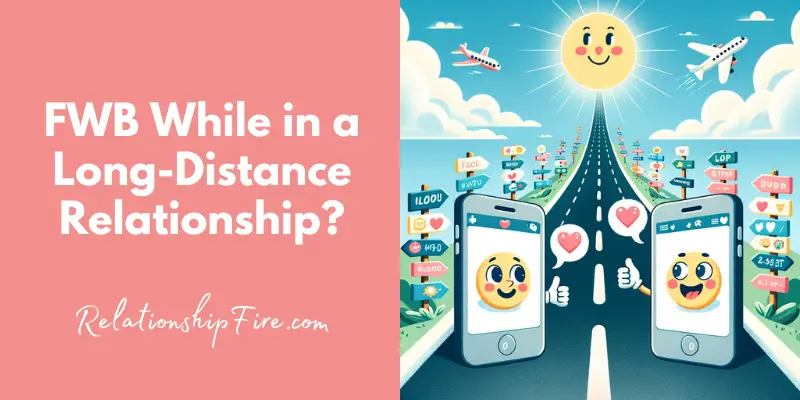The rules and boundaries of long distance relationships (LDRs) are as diverse as the people involved in them.
Is it okay to have friends with benefits while in a long-distance relationship?
You can have a friends with benefits (FWB) arrangement in a long-distance relationship if both partners agree, communicate openly, and set clear boundaries to ensure the primary relationship’s trust and emotional connection are maintained.
This question is deeply rooted in understanding human emotions, desires, and the nature of modern relationships.
Let’s explore the ins and outs of how to navigate this tricky emotional landscape.
The Emotional Landscape of Long-Distance Relationships

Long-distance relationships come with their unique set of challenges.
They require strong communication, immense trust, and a shared vision for the future. From my personal journey and learning, the emotional aspect can’t be overstated.
You and your partner may face loneliness, desire for physical closeness, and other emotional complexities.
It’s these feelings that often lead individuals to consider a friend with benefits (FWB) as a solution to physical absence.
The dynamics of an FWB while in a long-distance relationship can be tricky.
There’s a fine line between fulfilling physical needs and maintaining an emotional connection with your primary partner.
Balancing these can be daunting, and without transparency and established boundaries, there’s a risk of undermining the trust and security that are foundational to any relationship.
It is paramount to remember that emotions can’t be sectioned off as easily as physical miles between partners.
Communication and Boundaries
The cornerstone of any agreement between partners, especially in long-distance relationships, is communication.
During my own exploration of relationship dynamics, it became clear that partners must engage in honest, open conversations about their needs, expectations, and fears.
Discussing the idea of a friend with benefits is not a one-time conversation but an ongoing dialogue.
Creating boundaries is essential.
This is not just about setting limits but understanding each other’s comfort levels and respecting them.
Partners need to address the scope of the FWB relationship – will it be purely physical? How will it affect the primary relationship? Can emotional attachments be avoided?
It’s these questions that, if left unaddressed, can lead to misunderstandings and emotional turmoil.
Trust and Security in Your Primary Relationship
Trust is the bedrock of any relationship, more so in one that is long-distance.
Trust is not just about believing your partner will remain faithful. It’s about feeling secure that your relationship can withstand the challenges it faces, including the addition of friends with benefits.
Security in your relationship extends beyond trust.
It’s about knowing that your bond is strong enough to not be threatened by external sexual relationships.
But this can be complex, as trust and security are subjective and can be easily shaken by insecurities, jealousy, or the fear of replacement.
This is a delicate balance, and the decision to have an FWB arrangement should not be made lightly.
Managing Jealousy and Insecurities
Jealousy and insecurities are natural human emotions, especially in the context of relationships.
In my interactions with couples, it’s evident that these feelings can become magnified in long-distance situations.
When contemplating an FWB scenario, it’s vital to self-reflect and consider whether you and your partner are prone to jealousy or insecurities.
It’s not just about managing your own emotions, but also being mindful of your partner’s.
An FWB might seem like a practical solution to physical absence, but if it creates emotional distance or breeds distrust, it can do more harm than good. Therefore, thorough, candid discussions and check-ins with your partner are indispensable to navigate this terrain successfully.
Physical Needs Versus Emotional Connection
Physical intimacy is a basic human need and finding a balance while in a long-distance relationship is challenging.
My studies affirm that while an FWB can satisfy physical needs, it can complicate emotional connections.
It’s essential to distinguish between the two and understand the implications of intertwining them with an FWB.
The physical aspect of a relationship, while important, should not overshadow the emotional bond.
If the FWB starts to fulfill emotional needs, it could signal issues in the primary relationship that need addressing.
It’s crucial to constantly evaluate the impact an FWB is having on both the physical and emotional aspects of your long-distance relationship.
The Impact on Future Relationship Goals
Every relationship has its trajectory and goals.
Aligning on future plans is a critical step for long-distance couples. Before embarking on a friends with benefits arrangement, consider how it fits into your long-term vision.
Will an FWB be a temporary fix or a potential stumbling block for future intimacy with your partner?
How will it affect your plans for eventually closing the distance?
These questions are essential as they address the long-term implications of your decision and ensure that both you and your partner’s actions are conducive to your shared future.
Understanding Individual Needs and Expectations
In the sphere of long-distance relationships, recognizing and acknowledging each partner’s needs and expectations is crucial.
Each individual has a unique set of emotional and physical requirements that, when not met, can lead to dissatisfaction and discord.
Through my relationship education and experiences, I’ve learned that understanding these personal needs is the first step toward finding workable solutions.
Partners must engage in deep conversations about their own needs and how they envision the role of an FWB in their lives.
It’s important to discuss the nature of the FWB relationship openly.
That’s whether it’s meant to be a temporary measure or a longer-term fixture until the couple can reunite.
Both partners need to be clear about what they are comfortable with and where they draw the line, ensuring that this arrangement does not lead to future regret or resentment.
The Role of Mutual Consent
Mutual consent is another fundamental aspect of considering an FWB while in a long-distance relationship.
This isn’t just about saying “yes” or “no” to the idea.
It’s about ensuring that both partners are on the same page and agree on all terms related to the FWB. Mutual consent should come without pressure or guilt.
Every step taken should be with the full, enthusiastic consent of both individuals.
This includes consenting to the boundaries of the FWB relationship, such as frequency of encounters, types of activities allowed, and the degree of information shared about the FWB relationship with the primary partner.
Constant check-ins are essential to make sure that this consent is ongoing and that both partners are still comfortable with the arrangement.
Navigating Social Perceptions and Stigma
Social perceptions and stigma can play a significant role in the decision to have an FWB while in a long-distance relationship.
Partners should discuss how much weight they give to the opinions of friends, family, and society at large.
Couples should consider how they will handle potential judgment and the stress that comes with it.
Will they be open about their arrangement, or will they keep it private?
Understanding the possible social repercussions and preparing for them can help mitigate the stress that comes from external judgment, allowing the couple to focus on what’s truly best for their relationship.
The Importance of Self-Care and Personal Growth
Self-care and personal growth are pivotal in any relationship, especially in a long-distance one with the complexity of an FWB.
It’s important to not lose oneself to the relationship or the FWB arrangement but to continue pursuing personal goals and interests.
This focus on self-care can foster personal growth and lead to a healthier relationship with oneself and, by extension, with one’s partner. Activities such as exercise, hobbies, and socializing with friends and family can be integral to maintaining a balanced life
The FWB should not become the sole focus of one’s social and emotional life.
Rather, it should be one part of a well-rounded personal life.
Legal and Health Considerations
In my learning journey, I’ve come across the importance of legal and health considerations when engaging in any form of romantic or physical relationship.
Partners considering an FWB need to have frank discussions about health and contraception, as well as regular wellbeing check-ups.
This is essential to ensure the safety and well-being of all individuals involved.
From a legal perspective, it’s also important to consider the laws of the land.
Depending on where you are, there can be legal implications for engaging in physical activities, especially if they are considered outside of conventional relationships.
Understanding and adhering to these laws is necessary to avoid any legal troubles that could affect the relationship.
When an FWB Relationship Ends
Understanding the potential end of an FWB relationship is as important as understanding its beginning.
My experiences have shown me that these arrangements often have a shelf life. Whether it’s due to one partner developing deeper feelings, the long-distance relationship coming to an end, or simply a change in desires, an FWB arrangement rarely lasts forever.
Discussing how to conclude the FWB relationship respectfully and amicably is important.
This can help prevent any lasting damage to the friendship or the primary relationship.
It’s important to acknowledge that the end of an FWB arrangement does not signify failure but rather the evolution of individual needs and relationship dynamics.
Reflections on Compatibility and Relationship Success
One truth stands out—compatibility and communication are the cornerstones of relationship success, whether long-distance or otherwise.
When considering an FWB in a long-distance relationship, it’s the compatibility of each person’s values, desires, and boundaries that will ultimately determine if this is a sustainable path.
Compatibility does not mean being identical in needs and wants.
But rather having the willingness and ability to understand and respect each other’s perspectives.
Successful long-distance relationships with or without an FWB arrangement are built on a foundation of mutual respect, trust, and open communication.
Here is a good video on how to make long distance relationships work:
Final Thoughts: Is It Okay to Have Friends with Benefits While in a Long-Distance Relationship?
In the game of love and distance, sometimes you roll the dice on a FWB, but don’t gamble away the chance to explore more relationship strategies on our site.
Read This Next:

